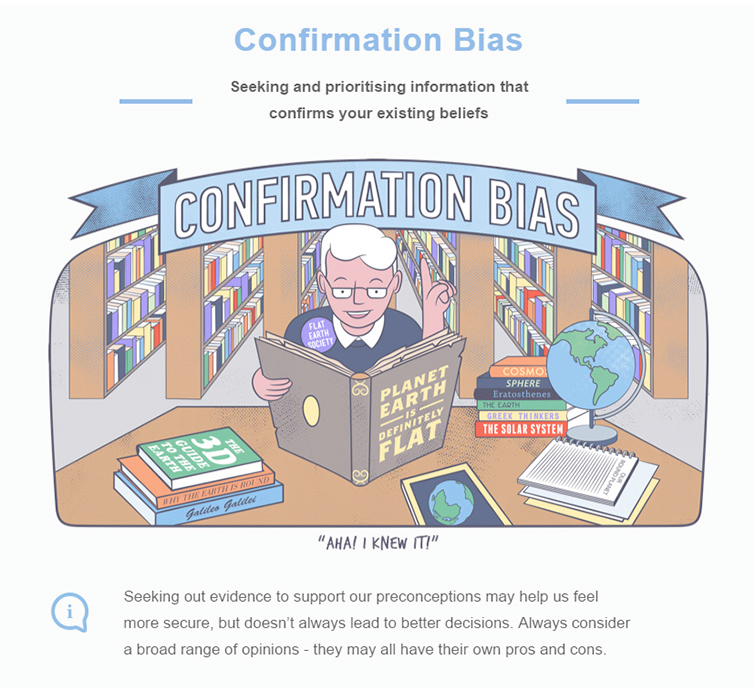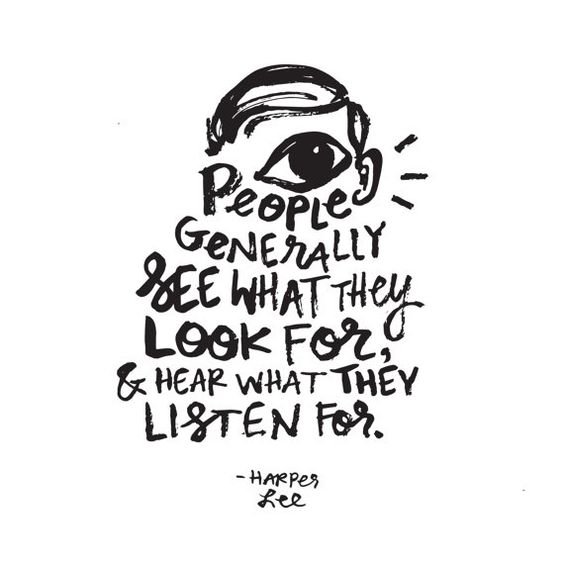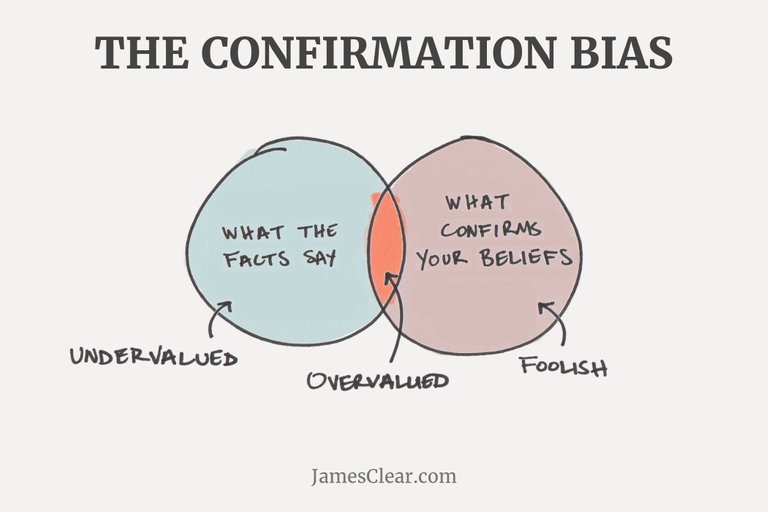
Have you ever heard of the term "confirmation bias" ?
If not, you will suddenly notice it everywhere after reading this article!
The confirmation bias describes a psychological phenomenon.
It means that once we have formed an opinion about something, we embrace information that supports this idea, but ignore anything hat doesn't go hand in hand with our opinion.
And this can be applied to many different situations:
If you already dislike someone, you are much more likely to highlight every tiny mistake they make, and don't acknowledge if they achieve something positive.
If you want something to be true, for example you want to believe that your partner didn't cheat on you, you are more likely to ignore or look over small evidences that might otherwise prove you wrong.
If you hear a rumour about someone you like, you are probably not going to believe it, but if it's about someone you dislike, you will think "I always knew there was something wrong with this person!"
Once you start thinking about it, you will notice that confirmation bias influences our opinions in a lot of different ways in our everyday life!

So what is the scientific reason for this way of thinking ?!
The most popular theory states that it's all about the motivation that someone has.
If you change the motivation, that person will stop being biased.
Example: Wishful thinking, believing what we want to believe and hearing what we want to hear!
If our motivation changed, if what we wanted to believe changed, we would suddenly view things from a different point.
Another, less popular theory states that it's not all about our point of view, but rather about all the things we're missing when getting new information.
We see things a certain way and on't even think about other possible ways, or that our first thoughts might not be correct and that the situation might be completely different.
So in a way, it's a misinterpretation, based on a lack of knowledge or concern about other points of view.

In the 80's, a very interesting experiment by Charles Lord tested both of these theories.
The study tested participants with strong pro- or contra- death penalty views.
They were presented with information that supported either the continuation or demolition of the death penalty, so depending on what the people already believed in, this information was agreeing or disagreeing with their internal views.
And the interesting results showed that both confirmatory and disconfirmatory information strengthened the participant's original views!
So even evidence against death penalties made death penalty-supporters support it even more.

The second study about the motivation-theory had participants answer questions about the effectiveness of death penalty, and information to support it or disapprove it.
But the key is that the participants were split into two groups, and received two different instructions.
One of them asked them to answer every step of the questionnaire as neutral as possible, as if they were a judge and had to come to the most fair conclusion.
The other instructions only asked the participants to note whether or not they would have acted in the same way, and to imagine the information being the complete opposite.
And now for the results:
Even when the participants were asked to analyze the information completely objectively, the results still showed that they answered the questionnaire with a totally biased opinion.
But in the group that had the "consider-the-opposite-instructions" the results showed that the biased opinions were overshadowed, the participants who always thought about the opposite information made much more objective choices and weren't influenced by their bias.
So In conclusion:
Once we have formed an opinion about something or someone, it can be quite hard to be convinced of the opposite.
We humans tend to acknowledge only information that supports our opinion, and ignore statements that would disagree with it.
This is linked to wishful thinking, we just really want something to be true, so we subconsciously select and filter the information we receive about the topic.
Confirmation bias appears almost everywhere in our everyday lives, and it can be quite hard to saty unaffected by this and remain an objective point of view!
Images: 1, 2, 3, 4, Sources: 1, 2, 3, 4, 5
- Instagram -

© Sirwinchester
t's so true. And yet, so many people think they hold the truth or a truth and pass it on to everyone. It is difficult to listen to the opinions of others and others do not often accept listening to your opionion. Everyone claims to have the best argument or the truth.
Exactly right!
And it also shows that we sometimes can't trust our own mind, it doesn't always reflect the actual truth!
Thanks for your comment!
This post has been ranked within the top 25 most undervalued posts in the first half of Feb 03. We estimate that this post is undervalued by $10.99 as compared to a scenario in which every voter had an equal say.
See the full rankings and details in The Daily Tribune: Feb 03 - Part I. You can also read about some of our methodology, data analysis and technical details in our initial post.
If you are the author and would prefer not to receive these comments, simply reply "Stop" to this comment.
Great Post Homie!
Thank you!
Very good read!!!! :) Thank you!
Thanks for your comment, and glad that you enjoyed the post!
Great article! It requires a very high level of mindfulness to "stay in objectivity" at all times, and to treat things simply as "information." And when we deal with fiery topics, the effect is amplified-- the political circus in the USA, being a good example... thoughts almost go upside down: people don't want facts, they only want supporting evidence of their already established beliefs.